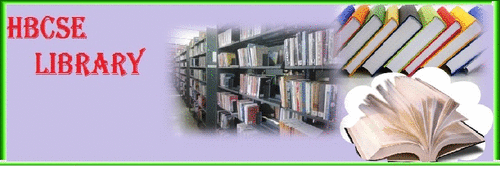Jan 2015
1 305.4 2858
Bharatiya Mahila Viagyanik: Special Issue (2014). Vigyan, 100(7).
2 305.4 2852
Laursen, Sandra L. (2014). Benefits for women and men of inquiry-based learning in college mathematics: a multi-institution
study. Journal for Research in Mathematics Education, 45(4), 406–418.
3 370 2854
Guenon, Rene (2014). Vidya aur Vigyan. Antim Jan, 3(8), 14-20.
4 370 2857
Scaria, Suma (2014). Do caste and class define inequality? Education Dialogue, 11(2), 153-177.
5 378 2872
Uchchashikshan: sadyasthiti aani bhavitavya: Special Issue (2014). Shikshanvedh, 5(4).
6 502 2849
Jiang, Feng (2014). Analysis of nature of science included in
recent popular writing using text mining techniques. Science &
Education, 23(9), 1785-1809.
7 502 2850
Rudge,
David (2014). Changes observed in views
of nature of science during a Historically
based unit. Science &
Education, 23(9), 1879-1909.
8 502 2851
Allchin, Douglas (2014). From science studies to scientific literacy: a view from the classroom. Science & Education, 23(9),
1911-1932.
9 507 2855
Garg, K. C. (2014). Uncitedness of Indian scientific output. Current Science, 107(6), 965-970.
10 507 2856
Matthews, Michael(ed) (2014). Select reviewed contributions 12th International History, Philosophy and Science Teaching
Group Conference: Special Issue. Science & Education, 23(10).
11 507 2859
Pam, Terence Yuk Ping (2014). Examining factors affecting science ahievement of Hong Kong in PISA 2006 using hierarchical linear modeling. International Journal of Science Education, 36(15), 2463-2480.
12 507 2860
Hodson, Derek (2014). Learning Science, Learning About Science, Doing Science: Different Goals Demand Different Learning
Methods. International Journal of Science Education, 36(15), 2534-2553.
13 507 286
Hillman, Susan J. (2014)
K-12 Students' Perceptions Of Scientists: Finding a Valid measurement And Exploring Whether Exposure To Scientists
Makes An Impact. International Journal of Science Education, 36(15), 2580-2595.
14 507 2862
Schram, Asta B. (2014). A
Mixed Methods Content Analysis Of The Research literature in science education
International Journal of Science Education,36(15), 2619-2638.
15 507 2863
Hansson, Lena (2014). Students' views concerning worldview presuppositions Underpinning science: is the world really
ordered, uniform, and comprehensible? Science Education, 98(5), 743-765.
16 507 2864
Polman, Joseph L. (2014). Adapting practices of science journalism to foster science literacy. Science Education, 98(5),
766-791.
17 507 2865
Jack, Brady Michael (2014). Igniting and sustaining interest among
students who have grown cold toward science. Science
Education, 98(5), 792-814.
18 507 2866
Suter, Larry E. (2014). Visiting Science Museums During Middle And High School: A longitudinal Analysis Of Student
Performance In Science. Science Education, 98(5), 815-839.
19 507 2867
Braun, Isabel (2014). Scholarly holds lead over popular and instructional: text type influences epistemological reading
outcomes. Science Education,98(5), 867-904.
20 507 2868
Chen, Sufen (2014). A Comparison of students' approaches to inquiry,conceptual learning, and attitudes in simulation-based
and microcomputer-based laboratories. Science Education, 98(5), 905-935.
21 507 2874
Glew, Robert H. (2014). Training in scientific manuscript writing. Current Science, 107(9), 1386-1392.
22 507 2879
Lee, S. (2014). Development of a model for measuring scientific processing skills based on brain-imaging technology:
focused on the experimental design Process. Journal of Biology Education, 48(4), 188-195.
23 507 2880
Martinez-Losada, Cristina (2014). How children characterise living beings and activities in which they engage. Journal of Biology Education, 48(4), 201-210.
24 507 2881
Mastese, Adam V. (2014). Nature of experiences responsible for the generation and maintenance of interest in STEM.
Science Education, 98(6),37-962.
25 507 2882
Mcconney, Andrew (2014). Inquiry, engagement, and literacy in science: a retrospective, cross-national analysis using PISA 2006. Science Education, 8(6), 963-980.
26 507 2883
Dawson, Emily (2014). "Not Designed For Us": how science museums and science centers socially exclude low-income,
minority ethnic groups. Science Education, 98(6), 981-1008.
27 507 2884
Henrichs, Lotte F. (2014).
Early science instruction and academic language development can go hand in hand: the promising effects of a low-intensity
teacher-focused intervention. International Journal of Science Education, 36(17), 2978-2995.
28 510 2878
Walshaw, Margaret (2014). Who Can Know Mathematics?. For the Learning of Mathematics, 34(2), 2-6.
29 510.7 2853
Campbell, Patricia F. (2014). Relationship between teachers' mathematical content and pedagogical knowledge, teachers' perceptions, and student achievement. Journal for Research in Mathematics Education, 45(4), 419-459.
30 523.4 2875
Venkateswaran, T. V. (2014). India Makes It To Mars... On The First Attempt Science Reporter, 51(11), 14-18.
31 523.4 2876
Pandey, Piyush (2014). Mom's resounding success. Science Reporter, 51(11), 19-23.
32 529.3 2871
Calendar ka itihaas aur vartaman: Special Issue. Electroniki Aapke Liye, 28(11).
33 539 2877
Vaidya, Paresh R. (2014). Leo Szilard: enigmatic crusader of the bomb. Science Reporter, 51(11), 24-28.
34 540.7 2869
Sjostrom, Jesper (2014). Humanizing chemistry education: from simple contextualization to multifaceted
problematization. Journal of Chemical Education, 91(8), 1125-1131.
35 575 2873
How we became human: Special Evolution Issue. Scientific American, 311(3).
36 919.07 2870
Teaching about places: Special Issue. Teaching Geography, 39(3).

